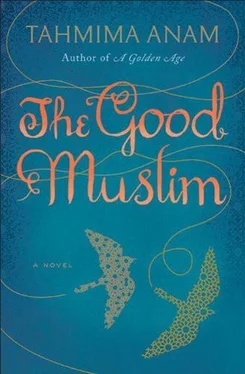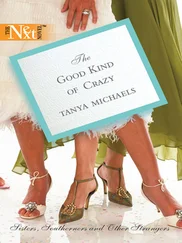It was bright, the sun reflecting off the painted white roof, but it was also cooler, the wind open and rough. There was a tiny ledge on the eastern corner, and they perched there together. The muezzin called again. There were a few others; a man rolled out a small rectangle of cloth and began to pray, dipping his head to the west. Unbidden, the words of the prayer came to Maya’s lips. She remembered her mother patiently teaching her the verses, and how reluctantly she had submitted at the hospital. An hour passed. The boy took his leave. ‘I have to sell the drinks,’ he said.
‘What is your name?’ Maya asked.
‘Khoka.’
‘Goodbye, Khoka.’ She waved, then added, ‘God be with you.’
The ferry gasped to life, the siren blaring as they began to move. Soon they approached the other side, floating towards the embrace of land, the sun light, high-spirited, on the horizon.
As she was leaving the ferry, Maya found Khoka waiting for her, hugging a small bundle. ‘Dakhtar, where are you going? Let me come with you. I can help.’ She saw him clearly now, in the full brilliance of the afternoon. He had dark, luminous eyes. He would be handsome one day, if he were fed properly. If his shoulders weren’t burned and bowed from long hours on the dock. But she didn’t want to be burdened by anyone; he would ask questions and she would not be able to answer them. ‘No, it’s all right.’ She reached into her bag for a few notes.
He shook his head, refusing the money, suddenly shy.
As soon as she hit the ferry ghat, she was surrounded by porters, tea-wallahs, chotpoti-vendors, boatmen, and all manner of people wanting to buy, sell or rent things. Dusk was already falling, but she wouldn’t stop here; she wanted to start travelling north, towards Chandpur. Clutching her bag, she scanned the shore for an empty country boat. The boatmen saw her and called out.
‘Apa, you need to go somewhere, come with me!’
‘Upstream, downstream, anywhere you like, apa, come, come.’
She hesitated beside one boat, suddenly unsure of what to do. She had travelled alone so many times, but as she looked around now and saw that she was the only woman on the shore, she found herself wishing she had brought Joy. You’re going soft, Comrade Haque. Irritated by her sudden lack of confidence, she waved to one of the boatmen.
‘I need to travel upstream,’ she announced.
‘Yes, yes,’ the boatman nodded, ‘let me take your things.’
‘Tell me the price first.’
‘Don’t worry about the price, sister.’ He reached out again, grazing the strap of her bag.
She pulled back. ‘Never mind,’ she said. ‘I’ve changed my mind.’
The man skipped lightly off his boat and came to stand beside her. ‘Don’t worry, sister, price will be fair. And anyway’ — he fished something out of the corner of his mouth, chewed on it, then spat it out — ‘a woman should not travel alone.’
She turned away, thanking him for his assistance. The other boatmen watched. ‘Lady doesn’t know where she wants to go!’ the man called out after her. ‘Letting a poor man go hungry, chee chee. At least leave us something for our trouble.’
The ridiculousness of the demand made her turn back. ‘What trouble? You should pay me, harassing me like that.’
His face darkened. ‘You think you can talk any way you like?’ He grabbed her arm. ‘Because you have money and I’m just a boatman?’
Her anger swelled. ‘You think you can talk to me any way you like, just because I’m a woman?’ She twisted away and headed back in the direction of the ferry, the man continuing to call out to her. People stopped washing their boats and stared. She was a spectacle, running up and down the shoreline all by herself.
Khoka was carrying a crate of Coke bottles on his shoulder. ‘I’ve changed my mind,’ she called out, trying to stop her voice from trembling. ‘Find me a boatman, an honest one, who will take me upriver.’
‘It’s too late, Dakhtar, no one will take you now. They’re all leaving the ghat, see, it’s getting dark.’
She gathered herself together, unbearably hot now, even though the day was turning from yellow to grey, and she wondered if she were doing the right thing, feeling the urgency of it, the black panic of not knowing where Zaid was. This boy, this cold-drinks boy, was so poor he had to spend all day stuck between one shore and another, opening bottle after bottle and never going to school. But he had that open sky above him, he could walk away on his own legs, with his own will.
‘Please, you have to find me someone. I’ll pay, I’ve got money. But it has to be tonight.’
‘All right, I will try.’ He relieved her of her bag and led her further down the shoreline. The boatmen were packing up their things, cleaning out their engines and bailing water. He left her at a small shop. She bought a packet of Nabisco and a cup of tea. He returned a few minutes later, leading her to a simple country boat. A very old boatman greeted her. ‘Chacha will look after you,’ Khoka said, ‘won’t you, Chacha?’
Khoka reached out to steady her as she stepped on to the boat. ‘With your permission, Dakhtar, I would like to come with you.’
‘You think I can’t make it on my own? I’ve done it before, you know. I was in the war.’
‘You were in the war? My uncle too. He has a scar here’, he said, running a finger along his cheek, ‘from a bullet.’
He smiled again, as though there were no tragedy in the world he hadn’t heard of, and conquered. ‘All right,’ Maya said, ‘come along, then.’
They set off as the sun whispered towards the horizon, moving against the current, the people on the shore growing smaller, into bright yellow specks, like lit cigarettes in a dark room. Through the slats in the bamboo she could see the water rising against the boat. They passed the first hour in silence. The boatman hummed as he rowed. Then Khoka said, ‘Dakhtar, I shouldn’t ask. But you’re in trouble?’
Maya hesitated, wondering if he would understand any of it. ‘I’m looking for a boy. My nephew.’ As she started to speak the story poured out of her, about how she had returned, after her long absence, to the bungalow in Dhaka, her mother’s illness, the appearance of Zaid.
Khoka’s face moved with every episode of the story. She could tell he was thinking of himself, comparing his life and his miseries with those of the other boy. He was adding it up: the death of his parents, the long days he spent carrying the crates of drinks up and down the ghat. All the other hidden injuries. By the end, she had almost forgotten where she was as she described Rokeya’s disclosure, her meeting with Sohail. When she looked up, she saw Khoka’s eyes were shining. He leaned over the side of the boat, took a handful of water and splashed it on his face.
It would not have been appropriate for him to embrace her. But when he wiped his face roughly with his palms, it was as though he held her; as if he had said, you are right to be here, to be on this boat, to be travelling upriver in search of this boy. When you find him, you will also find me.
And this is how they passed their journey upstream, with the Jamuna pounding its banks, demanding its passage, breaking and swallowing pieces of the shore as it went, propelling them towards their destination, at its own pace, its own command.
She told Khoka what she knew of the madrasa.
‘You don’t know the name?’
‘No. I’m not familiar with these parts.’
‘You don’t know the village?’
‘No. I’m sorry.’
‘Then we will go to every madrasa in every village near Chandpur and we will find him.’
Zaid had said it was surrounded by water. She hadn’t understood before, but now she saw what he meant. The river was so vast, and so fierce, it created islands of its own. She had heard of these but she had never seen them. Khoka told her they were called chars, and he pointed them out to her now, shallow, floating cakes of land, rising just inches from the water, scattered with pale shoots of grass.
Читать дальше












